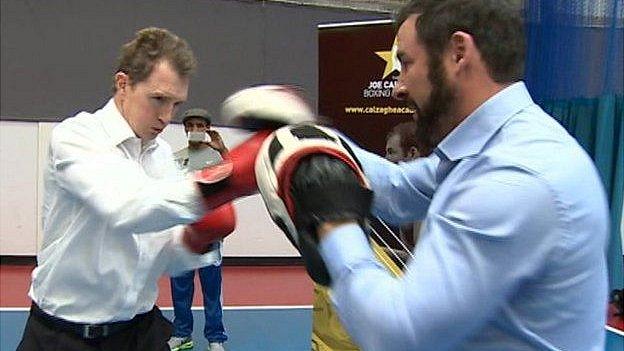Committee roles for Davies, Davies, Davies (and Davies)
- Published
- comments

Fighting fit: Monmouth Tory MP David T.C.Davies (left) is struggling to recruit members to his committee.
It's the main forum for Welsh issues at Westminster. So why are MPs so reluctant to join it?
It appears that the Commons select committee on Welsh affairs, external will initially be established with just six members, all men. It usually has 11, the maximum allowed.
Only two of the 28 Labour MPs from Wales - Geraint Davies and Paul Flynn - have put their names forward.
Among the Conservatives, Monmouth MP David T.C. Davies has been elected chair but he has only two colleagues from his own party - Chris Davies and Glyn Davies.
Glyn Davies is also parliamentary private secretary to Welsh Secretary Alun Cairns and, although he may be among the more independent-minded MPs, it is very unusual for a junior member of the government to sit on the committee set up to scrutinise his boss's department.
'Crucial'
Plaid Cymru have focused their attention on the lack of Labour members, accusing its MPs of neglecting their duty to hold the government to account.
Ceredigion MP Ben Lake who does want to sit on the committee said: "The Welsh affairs committee produces crucial work and was influential in the previous Parliament on matters such as railways, the steel industry and agriculture. It's important that MPs take this work seriously.
"Labour's empty promises of 'standing up for Wales' and to 'stop the Tories trampling all over Wales' are frankly laughable when we see the reality of how little they do in Westminster."
Over to a Welsh Labour spokesperson: "This absurd attack from Plaid Cymru is their usual mix of inaccuracy, wilful misrepresentation and sheer desperation. More than half of Welsh Labour's MPs have shadow frontbench roles, which precludes a majority of Welsh MPs from sitting on committees.
"But this means that Welsh Labour MPs are better represented than ever in the shadow cabinet and across the shadow front bench, and enables them to stand up for Wales and hold the Tories to account day in, day out. From Brexit to Equalities, Justice to Culture, Defence to Home Affairs, Welsh Labour MPs are leading the fight against this appalling Tory government and standing up for Wales."
'Ambiguous'
The committee does have an ambiguous role in the age of devolution. In the old days, it scrutinised the Welsh Office, which had responsibilities in areas for such as education and health.
Today's Wales Office has few executive powers but under David T.C. Davies the committee has broadened its remit to look at issues that matter in Wales, such as the steel industry and Severn Bridge tolls.
But compared to the relative glamour of committees scrutinising Brexit, business or the Treasury it appears to have relatively little appeal for MPs.
It would not be surprising if more MPs were added to the membership, but another Commons motion would have to be agreed before that happens.